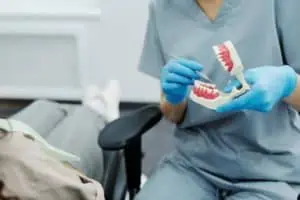
In & Out Procedure
Wisdom teeth removal is done in a dental or oral surgeon’s office and you will get to go home the same day. The level of anesthesia will depend on your individual needs and your doctor’s recommendation. Using local anesthesia over general anesthesia typically means you’ll get to go home sooner as general anesthesia takes longer to wear off. Make sure you have someone available to drive you home and keep an eye on you for 24 hours.
Care At Home
Once you get home from your procedure, you may still feel tired. You may also experience some pain, swelling, bleeding, and discomfort. To help with these symptoms, apply ice to your cheeks using a thin cloth in between your skin and the ice pack and take medications including antibiotics and pain medicine as recommended.
Recovery Time
The typical recovery time from wisdom teeth surgery is about three to four days. However, if your wisdom teeth were impacted, recovery could take a week or two. Keep in mind, complete healing of the gums can take longer, up to a few months. Taking precautions and keeping an eye out for any signs of a problem can help speed up recovery.
Signs of Complications
Call your dentist in Asheboro if you suspect any concerning complications, such as:
- Trouble swallowing or breathing
- Fever
- Numbness
- Excessive bleeding
- Pus coming out of your gums or nose
Tips for Recovery
Following these easy tips during your recovery can help prevent infections, dry mouth, and complications.
- Avoid smoking and drinking from straws
- Don’t eat crunchy or sticky foods
- Rest and don’t do any strenuous activities for at least three days
- Drink plenty of water
- Enjoy soft foods like mashed potatoes, applesauce, and yogurt
- Gently rinse with any doctor-recommended products
Knowing what to expect before any surgery can help you feel calm, relaxed, and prepared. If your dentist in Asheboro recommends having your wisdom teeth removed, find relief in knowing that this procedure is only recommended if necessary and will help set you up for a lifetime of good oral health.















